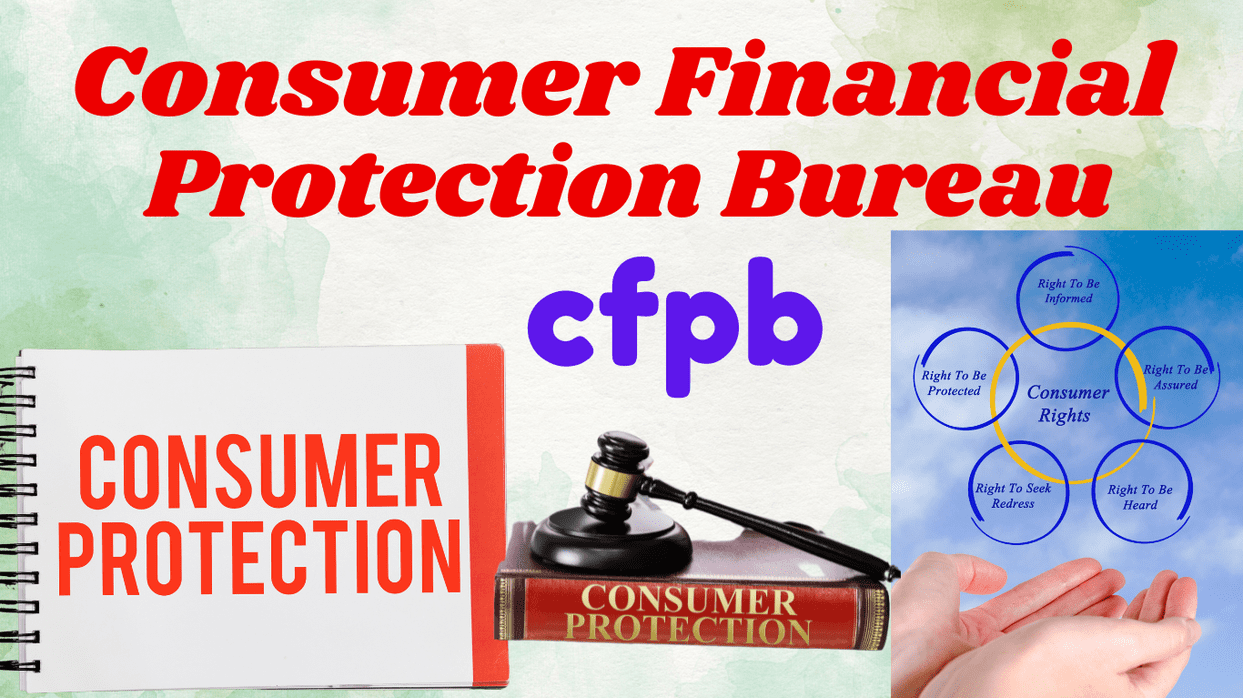Overview of the Consumer Financial Protection Bureau – CFPB :
The CFPB, or Consumer Financial Protection Bureau, is a federal agency in the United States that was established in 2010 under the Dodd-Frank Wall Street Reform and Consumer Protection Act.
- Its main purpose is to safeguard consumers from unfair, deceptive, or abusive practices within the financial sector, ensuring they have access to straightforward and accurate information when making financial choices.
The CFPB supervises a range of financial products and services, including:
- – Mortgages
- – Credit cards
- – Student loans
- – Payday loans
- – Auto loans
- – Debt collection practices
The agency also enforces various rules and regulations to ensure that financial institutions treat consumers with fairness and transparency.
What does the CFPB do?
The Consumer Financial Protection Bureau ( CFPB ) is essential in promoting fairness and transparency in the financial world. Here’s an overview of its key responsibilities:

1. Consumer Protection :
- The Consumer Financial Protection Bureau ( CFPB ) enforces laws designed to safeguard consumers from potentially harmful financial practices, including issues related to credit, mortgages, payday loans, and student loans.
- It offers a platform for consumers to file complaints about financial products and services, taking the time to investigate these complaints and hold financial institutions accountable when necessary.
2. Regulating Financial Products :
- The Consumer Financial Protection Bureau ( CFPB ) develops and enforces rules governing financial products such as credit cards, mortgages, student loans, and auto loans.
- These guidelines aim to ensure consumers have clear information, fair treatment, and protection from exploitation.
- For instance, it mandates straightforward disclosures regarding mortgage terms to help consumers grasp what they’re signing up for.
3. Monitoring Financial Institutions :
- The agency oversees and examines large banks and credit unions to ensure compliance with consumer protection laws.
- It also collaborates with smaller financial institutions, ensuring they adhere to regulations and do not engage in harmful practices.
4. Promoting Financial Literacy :
- – The Consumer Financial Protection Bureau ( CFPB ) supplies resources to empower consumers in making informed financial decisions, covering debt management, savings, credit reports, and how to avoid scams.
- – It focuses on educational programs aimed at vulnerable groups, helping them understand their financial rights and options.
5. Enforcement Actions :

- When financial institutions infringe on consumer protection laws, the Consumer Financial Protection Bureau – CFPB can take enforcement actions, which may include fines, penalties, or lawsuits.
- The agency actively pursues legal actions against companies involved in unfair lending and deceptive marketing practices.
6. Ensuring Fair Lending :
- The Consumer Financial Protection Bureau – CFPB advocates for equal treatment of consumers, regardless of race, gender, or other protected characteristics when accessing financial products.
- It enforces laws like the Equal Credit Opportunity Act and the Home Mortgage Disclosure Act.
7. Consumer Education and Advocacy :
- The Consumer Financial Protection Bureau – CFPB is dedicated to informing consumers about their rights and the tools available to make better financial choices.
- This includes online resources like calculators, budget planners, and debt management guides.
- It also works to promote policies that serve consumer interests, addressing concerns such as predatory lending and high-interest rates.
- Overall, the CFPB is committed to building a safer financial environment for all consumers.
- Overall, its mission is to provide consumers with access to fair and transparent financial products and services while protecting them from harmful practices through rule enforcement, complaint investigations, public education, and support for stronger consumer protection laws.
Who Oversees the CFPB?
- The Consumer Financial Protection Bureau (CFPB) is led by a Director appointed by the President of the United States and confirmed by the Senate.
- This Director is responsible for managing the bureau’s operations and making key decisions.
- The Director serves a five-year term and can be reappointed, but ultimately, the position is subject to the President’s discretion.
- This arrangement is intended to allow the Director to operate independently in order to safeguard consumer interests, even though the President influences the appointment.
- As of now, the Consumer Financial Protection Bureau – CFPB is structured into various divisions including supervision, enforcement, and consumer education, all functioning under the Director’s leadership.

What Areas Does the CFPB Investigate?
The Consumer Financial Protection Bureau – CFPB’s primary mission is to investigate a variety of financial activities and practices to protect consumers from harm. Here are some key focus areas:
1. Unfair, Deceptive, or Abusive Practices :
The Consumer Financial Protection Bureau – CFPB looks into companies that engage in unfair or deceptive practices concerning financial products and services.
Some examples include:
- – Predatory lending, such as payday loans with excessively high interest rates.
– Misleading advertising that does not accurately reflect the terms or costs of financial products.
– Harassment or illegal threats in abusive debt collection practices.
2. Violations of Consumer Protection Laws :
The Consumer Financial Protection Bureau – CFPB examines any breaches of significant consumer protection laws, including:
- The Truth in Lending Act (TILA), which mandates clear loan term disclosures.
- The Fair Debt Collection Practices Act (FDCPA), which shields consumers from abusive debt collection methods.
- The Equal Credit Opportunity Act (ECOA), which prohibits prejudice in lending practices.
- The Dodd-Frank Wall Street Reform and Consumer Protection Act, the legislation that established the CFPB.
3. Consumer Complaints :
The Consumer Financial Protection Bureau – CFPB directly addresses consumer complaints about financial institutions and investigates issues such as:
- – Credit card concerns, like incorrect billing and hidden fees.
- – Mortgage problems, including disputes over loan terms and foreclosure processes.
- – Student loan issues, especially regarding deceptive practices by servicing companies.
- – Concerns related to payday and auto loans involving unfair interest rates and misleading terms.

4. Financial Institution Practices :
- The Consumer Financial Protection Bureau – CFPB conducts investigations into various financial institutions including banks, credit card companies, payday lenders, and mortgage firms to ensure compliance with consumer protection laws.
This involves:
- Scrutinizing marketing practices for financial products.
- Assessing the transparency and fairness of loan terms.
- Checking for discriminatory practices in lending.
By focusing on these areas, the Consumer Financial Protection Bureau – CFPB works to defend consumers’ rights in the financial sector.
5. Mortgage and Foreclosure Practices :
The Consumer Financial Protection Bureau – CFPB looks into mortgage lenders to ensure they aren’t engaging in harmful practices, including:
- Not providing clear and accurate mortgage disclosures.
- Unfairly foreclosing on homes or using illegal foreclosure techniques.
- Charging hidden fees or excessive costs during the mortgage process.
6. Student Loan Issues :
The Consumer Financial Protection Bureau – CFPB examines student loan services and lenders for:
- Misleading practices regarding repayment terms and interest rates.
- Poor communication about repayment options or forbearance.
- The financial impact of for-profit colleges on students.
7. Payday and Auto Loans :
- This area focuses on predatory lending practices, making sure borrowers are not subjected to exorbitant interest rates or deceptive terms.
8. Debt Collection Practices :

- The Consumer Financial Protection Bureau – CFPB investigates companies that resort to abusive tactics in debt collection, which includes harassment, misleading information, or unlawful threats, in accordance with the Fair Debt Collection Practices Act (FDCPA).
9. Credit Reporting Issues :
- It scrutinizes issues related to credit reporting, such as errors in credit reports or unfair actions by reporting agencies, ensuring consumers receive accurate and equitable credit information.
10. Data Breaches and Consumer Privacy :
- The CFPB investigates cases where consumer financial data is mishandled or compromised due to inadequate practices or breaches by financial institutions, ensuring the preservation of consumer privacy rights.
Key Actions the Consumer Financial Protection Bureau – CFPB Can Take in Investigations :
- Enforcement Actions : If a violation of consumer protection laws is identified, the CFPB can impose fines, penalties, and require companies to alter their business practices.
- Consumer Redress : The Consumer Financial Protection Bureau – CFPB strives to secure financial compensation or restitution for consumers harmed by illicit company actions.
- Rules and Regulations : When necessary, the CFPB can introduce new regulations to curb future abuses or clarify the legal requirements for financial institutions.
What is the Purpose of the CFPB?
- The Consumer Financial Protection Bureau (CFPB) was established to safeguard consumers from unfair, deceptive, or abusive practices within the financial sector, ensuring access to fair and transparent financial products and services.
- Its creation was prompted by the 2008 financial crisis, which highlighted the urgent need for a robust regulatory body to protect consumers from detrimental practices in banking, lending, and other financial services.

Key Purposes of the CFPB :
Protect Consumers’ Financial Rights :
- The Consumer Financial Protection Bureau – CFPB is committed to ensuring that consumers can make informed financial decisions while protecting them from misleading or exploitative tactics employed by financial institutions.
Promote Fairness in the Financial Market :
- The bureau strives to guarantee that every consumer, regardless of background or financial status, can access fair and affordable financial products like mortgages, credit cards, and loans.
Enforce Consumer Protection Laws :
- The Consumer Financial Protection Bureau – CFPB is responsible for enforcing regulations that govern the financial industry, ensuring compliance with laws such as the Truth in Lending Act and the Fair Debt Collection Practices Act.
Prevent Harmful Practices in Financial Products :
- The bureau actively works to eliminate practices such as predatory lending, discriminatory lending, and deceptive advertising that could harm consumers, especially those most vulnerable.
Educate and Empower Consumers :
- The Consumer Financial Protection Bureau – CFPB provides essential tools, resources, and educational materials to help consumers navigate financial products and make informed choices. This includes guidance on budgeting, saving, and managing debt.
Ensure Transparency in Financial Products :
- By establishing rules for clear and concise disclosures, the Consumer Financial Protection Bureau – CFPB enables consumers to grasp the terms, fees, and associated risks of financial products, facilitating better comparisons between options.
Investigate and Hold Financial Institutions Accountable :
- The CFPB investigates complaints and monitors financial institutions for compliance with consumer protection laws, possessing the authority to enforce action—including fines and legal steps—against companies that violate rules.
Promote a Healthy Financial System :
- In its broader mission, the CFPB seeks to cultivate a stable and ethical financial environment where consumers can confidently access and utilize financial products, thereby enhancing the overall well-being of the economy.

Conclusion :
- To sum up, the Consumer Financial Protection Bureau – CFPB investigates financial practices that may harm consumers, such as unfair lending, misleading advertising, illegal debt collection, and overarching violations of consumer rights.
- It ensures that financial institutions operate with transparency and fairness, adhering to legal standards.
- The CFPB also advocates for policies aimed at protecting consumers and addressing issues like predatory lending and high-interest rates.
- The CFPB’s mission centers around protecting consumers from harmful financial practices, ensuring access to fair and transparent financial products, and fostering a healthy and stable financial system.
- It achieves these goals through law enforcement, complaint investigation, consumer education, and by holding financial institutions accountable for their actions.
- Furthermore, the CFPB investigates complaints and holds companies accountable for any violations of consumer rights, with the aim of enhancing the overall financial system.
Frequently Asked Questions :
What is the Consumer Financial Protection Bureau (CFPB)?
Answer :
- The CFPB is a U.S. government agency that was created in 2011 to oversee consumer protection in the financial industry.
- And encouraging consistent reporting on information that matters most to consumers contributes to protecting their interests in the financial marketplace.
What kind of issues does the CFPB address?
Answer :
- The CFPB deals with a broad range of consumer financial issues, including credit card, mortgage, student loan, auto loan, payday loan and debt collection complaints.
- To protect consumer rights, it deals with misleading advertising, excessive fees, and unfair lending practices.
How can consumers file a complaint with the CFPB?
Answer :
- Consumers can file a complaint at the agency’s official website.
- The process is quite simple, and the company asks consumers to detail their issues with financial products or services, including inaccurate billing, excessive fees or deceptive lending practices.
- The CFPB generally investigates complaints and attempts to resolve issues on behalf of consumers.
What role does the CFPB play in regulating financial institutions?
Answer :
- The CFPB oversees banks, credit unions and non-bank lenders for compliance with federal consumer protection laws.
- The agency performs examinations and enforcement actions to ensure compliant behavior with an emphasis on marketing practices, loan terms, and discrimination in lending.
What consumer protection laws does the CFPB enforce?
Answer :
- The CFPB also oversees many important consumer protection laws, including the Truth in Lending Act (TILA), Fair Debt Collection Practices Act (FDCPA), and Equal Credit Opportunity Act (ECOA).
- It also oversees provisions added by the Dodd-Frank Wall Street Reform and Consumer Protection Act that created the agency.
How does the CFPB educate consumers about financial products?
Answer :
- The CFPB has a ton of educational materials on its website designed to help consumers make educated financial decisions.
- It covers budgeting, saving, borrowing, and credit reports and scores. The agency also runs public outreach programs that help consumers become aware of their financial rights and responsibilities.








